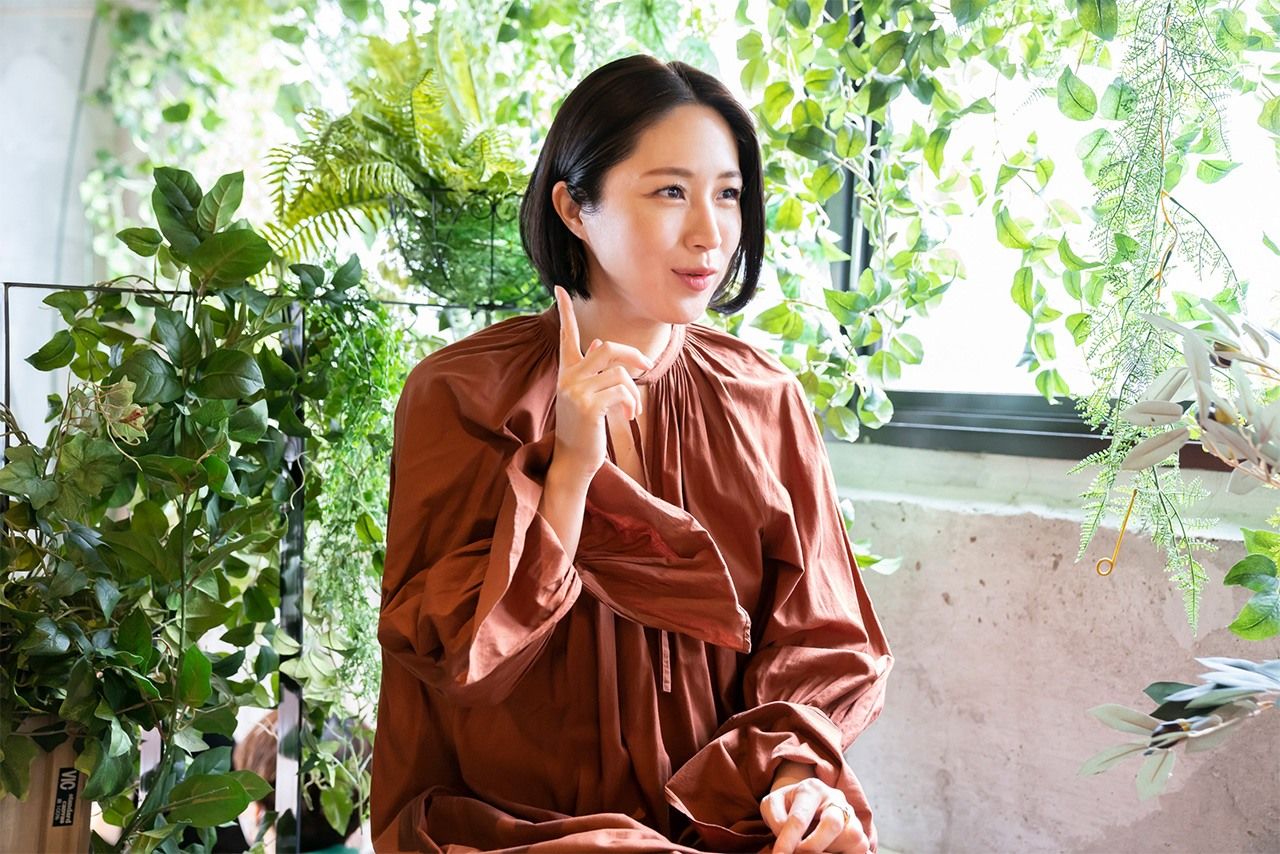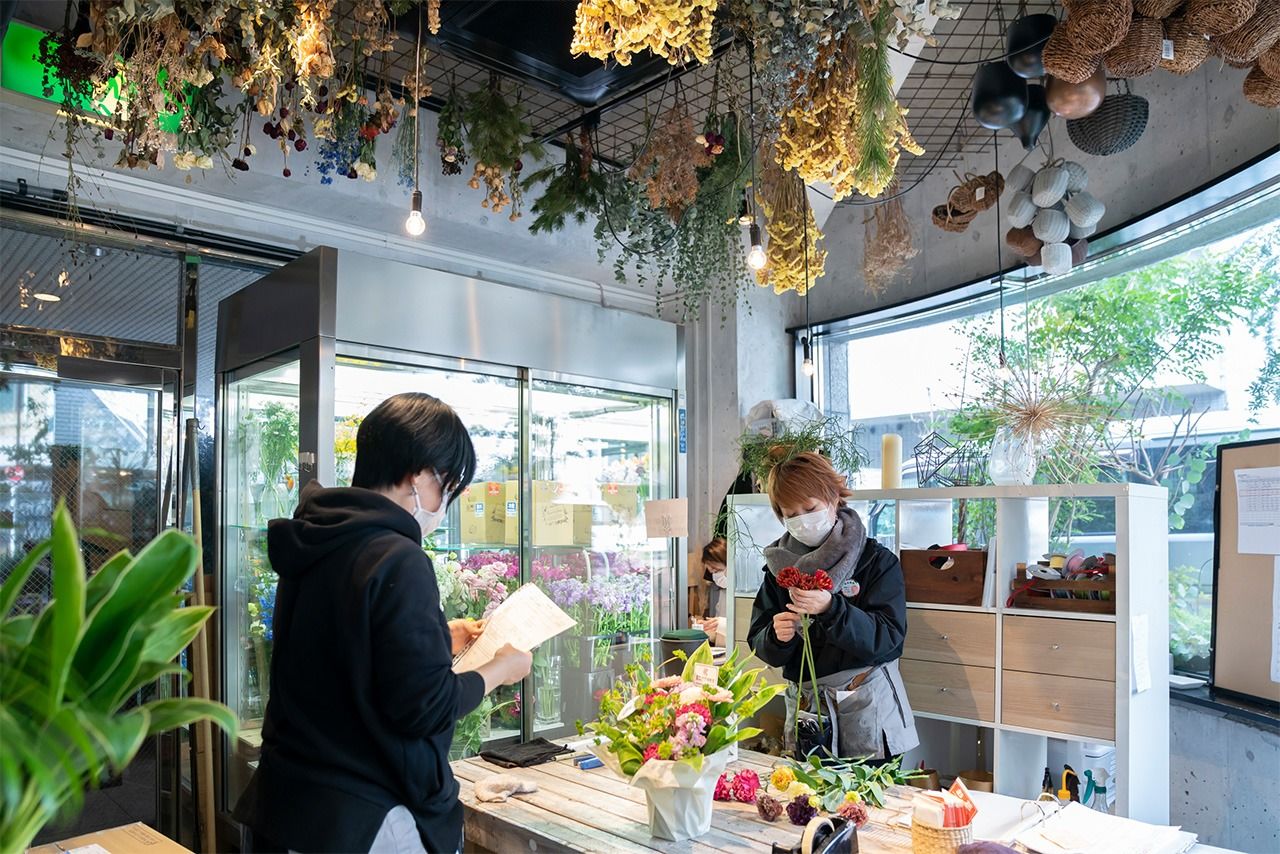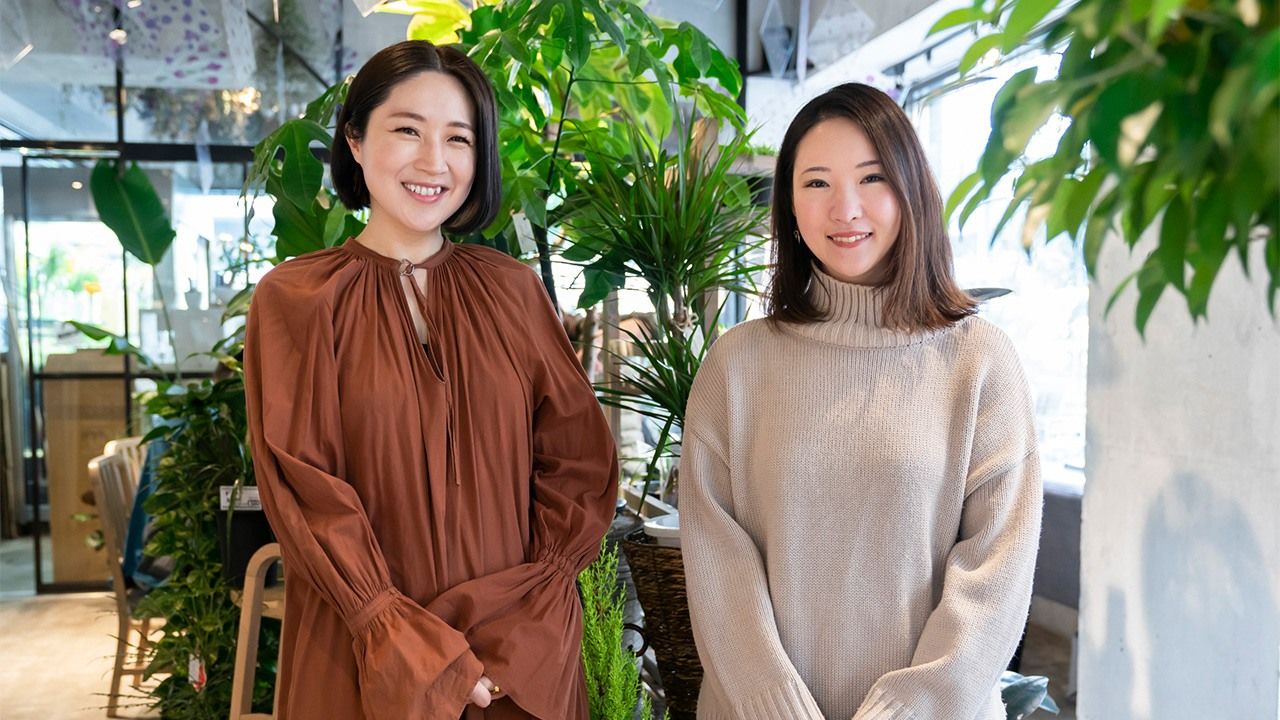
Face-to-Face with Japan’s Female Leaders
Florist Fukuju Mizuki: Taking a Different Approach to Social Assistance
Society Work Health- English
- 日本語
- 简体字
- 繁體字
- Français
- Español
- العربية
- Русский
Keeping an Eye on the Needs of Society
INUYAMA KAMIKO Japan today is seeing a growing focus on employment of disabled persons in a manner that respects their dignity as workers. How did you first become interested in the issue?
FUKUJU MIZUKI I started working for a sports management company right out of university, helping professional baseball players set up philanthropic projects. I was uncertain about the path I wanted to take, and the experience impressed on me the importance of giving back to society. Being of service to others gave my life new meaning, and it got me thinking about what more I could do.
So in 2013, when I was 23, I opened my flower shop, Lorans, and after three years in business I started hiring staff with physical and emotional disabilities. At the time, employment of disabled persons typically was framed as a social issue. However, I wanted to shift the narrative away from the one-sided perception that people with disabilities must be supported and frame them instead as stakeholders who contribute to society.
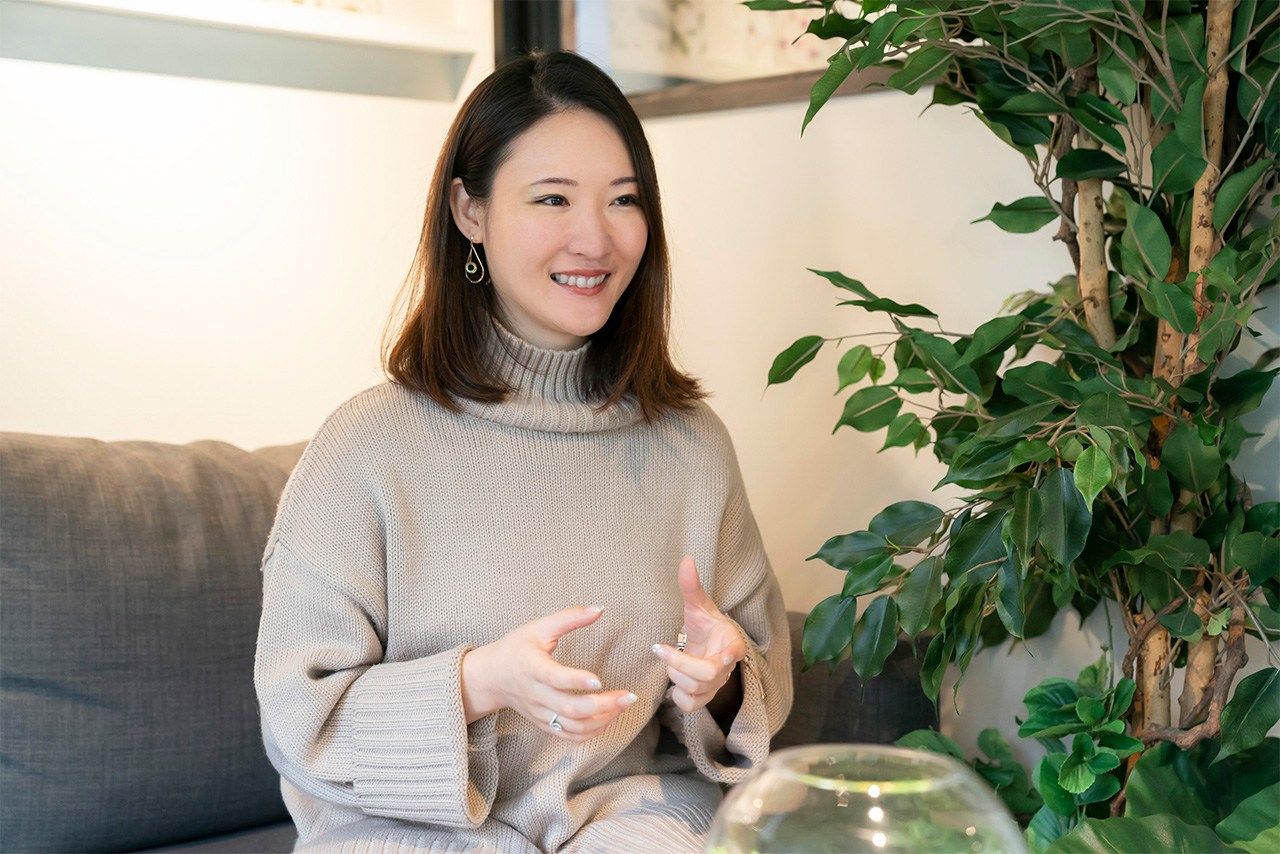
Fukuju Mizuki, owner of Lorans.
INUYAMA As well as employing persons with disabilities, Lorans focuses on showing how people who are receiving work support contribute to society in a deep and meaningful way. This has particularly been the case with your program to help disadvantaged children. What was the genesis of this effort?
FUKUJU The pandemic has been hard on families that are struggling financially, and I had the idea of opening up the café part of the store to local children. We initially provided meals once or twice a month as part of a Shibuya municipal initiative called Children’s Table. As the coronavirus situation worsened, though, we closed the shop or reduced business hours in line with government recommendations. It became harder to provide in-person meals, so we shifted to deliveries. Fortunately, the word of the program spread, and the number of companies offering financial and other support steadily grew.
It quickly became apparent from news reports and other sources that the pandemic was hitting single-parent households particularly hard due to businesses shutting down. The scale of the problem was brought into stark focus when a new staff member with experience in the field pointed out that one in seven Japanese children live below the poverty line.
Along with providing meals, I decided to open the shop as a kind of after-school daycare. We continue delivering meals, and with financial help from the Nippon Foundation, the café is now open to local children on weekdays from five to seven in the evening.
INYUAMA I was particularly interested in how you involved floristry in the program, such as decorating tables with flower arrangements to create a warm atmosphere.
FUKUJU Since Lorans is a flower shop first and foremost, it made sense to incorporate that side into the program. Some of the children take the flowers home to their mothers, which we hope helps foster communication between parent and child.
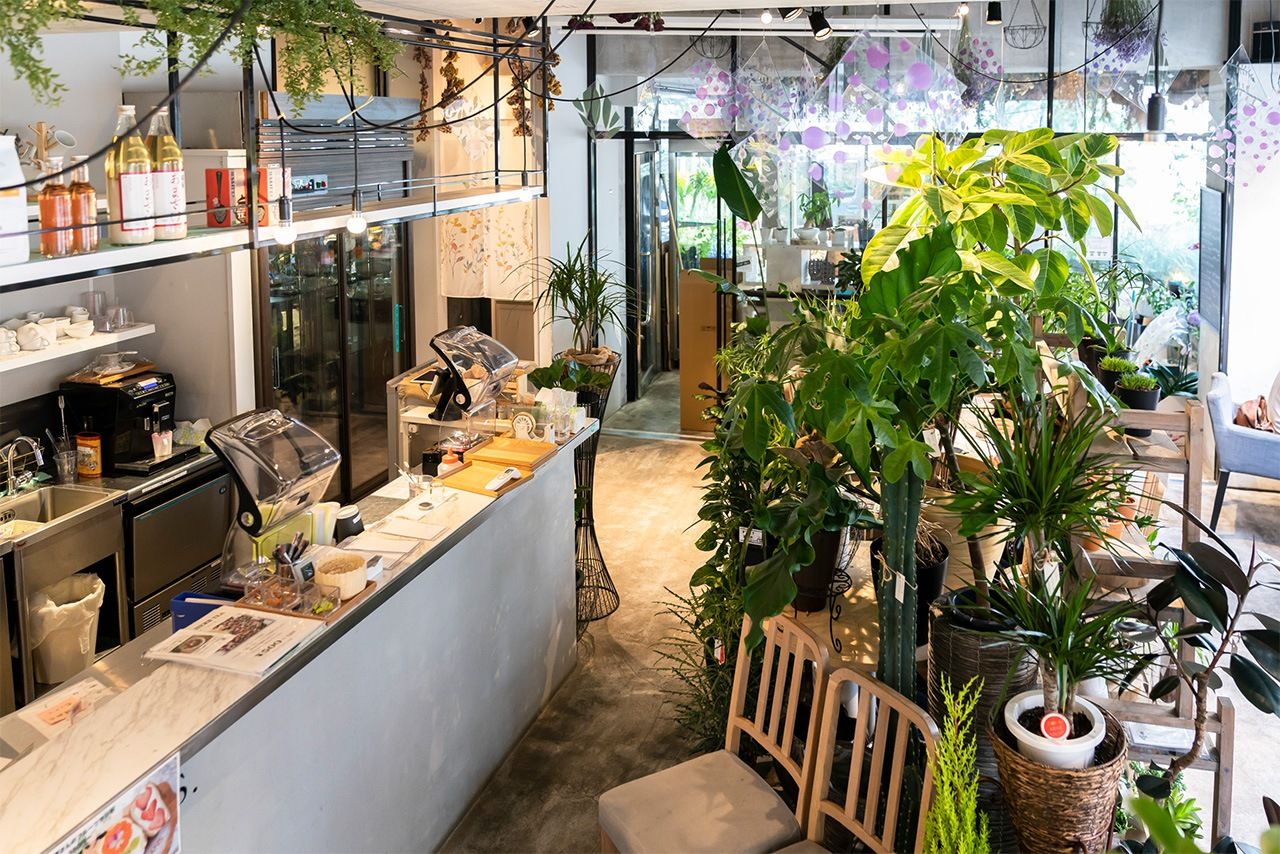
The interior of Lorans in Harajuku.
Providing an Adult Presence
INUYAMA Providing meals fulfills a basic physical need, but it is also comforting, which has a positive impact on children’s emotional wellbeing. Have you seen this at Lorans?
FUKUJU Growing up in Ishikawa Prefecture, I regularly came into close contact with different adults in the community. This is something that I’ve found to be lacking in the lives of many children in Tokyo. They interact with their teachers and friends’ parents, of course, but they don’t have many opportunities to spend time with other adults in the community.
At the shop, though, children can talk and hang out with staff as well as the university students who volunteer. Through these interactions they get to experience different life perspectives, which helps them grow as individuals. They also benefit from spending time in the company of peers other than their siblings or school friends. Many of the children are in similar situations, such as having to spend hours at home alone while their parents are at work, and can share their feelings of loneliness and other concerns. Sometimes quarrels break out, but even these are important as they help children learn to deal with individuals outside their normal circle of family and acquaintances.
How to Keep Assistance Programs Running
INUYAMA Children who are suffering abuse or neglect at home, or are struggling to fit in at school, often seek solace on the streets, which puts them at risk of further abuse. The pandemic has shown just how important it is to have places outside of school and home where children can spend time in a safe, supervised environment. However, funding and staffing such initiatives is a challenge. How do you do it at Lorans?
FUKUJU It’s vital to give children places where they can go and safely hang out, but establishing and maintaining such programs is no easy task. Many groups rely on community centers, where they rent rooms to provide meals. The government provides a level of support, but funding is often minimal and groups frequently have to reach into their own pockets or find other means of covering costs. There are many hurdles to overcome, and organizers need to be flexible in their approaches to keep programs going. One tactic would be for authorities to make it easier to work together with local restaurants to allow children to come in during off times between lunch and dinner, when shops aren’t as busy. Incorporating neighborhood businesses into a program is good because it makes it easier for children to regularly utilize the spaces.
I took the approach of covering the costs of meals and staff with the donations we receive from supporting companies, positioning this program as part of our corporate social responsibility activities. Relying on volunteers and other support is great, but without a steady source of financing, a program can unexpectedly find itself short of funds and have to fold. This is something I experienced helping with the philanthropic work of professional baseball players, who would support the programs they established as long as they were playing and making money, only to pull financial backing once they retired.
I hope Lorans can become a model for other organizations. This of course means getting things right on our end. There is a mountain of issues to contend with, and we are doing our best to deal with new challenges as they arise.
Different Views to Include
INUYAMA How have the shop’s disabled staff responded to the child meal program?
FUKUJU It’s been a very fulfilling experience. Many of our staff are dealing with emotional disabilities stemming from family situations or issues in their relationships with the people around them. One staff member says that it has been a healing experience to do for the children what she wished her mother had done for her. As a person who is often on the receiving end of support efforts, it’s wonderful that she is learning the joy of assisting others.
Another positive outcome is that staff are now more willing to take the initiative in their work, whereas in the past they would often wait for instructions. Typically, persons with disabilities are entrusted with only simple tasks. For instance, they may be put to work assembling components without even knowing what the final product is. This approach suits some people, of course, but I feel it’s important to clearly convey to staff the importance of their contributions so they can share in the pleasure of bringing happiness to others. This in turn deepens their sense of gratitude when they receive help. I’ve noticed this especially in how staff now say thank you to each other more often.
The children’s meal program has been an invaluable experience that has reinforced the benefits of giving disabled staff the opportunity to enjoy contributing to the organization in an equal and meaningful way. As Lorans moves forward, I want the perspectives of our employees to guide our trajectory as we continue the children’s project and further grow our staff.
INUYAMA It’s a wonderful project, and it’s refreshing to see a focus on removing obstacles to social participation by a diverse group of people, rather than on their disabilities alone. It’s clear that your staff are experiencing the joy that comes with being needed by others—I hope we’ll see many more workplaces like this take shape in the future. Thank you for your time today!
(Originally published in Japanese. Banner photo: Fukuju Mizuki, right, and Inuyama Kamiko at flower shop Lorans in Tokyo’s Harajuku. All photos © Uwadaira Tsunebumi.)

